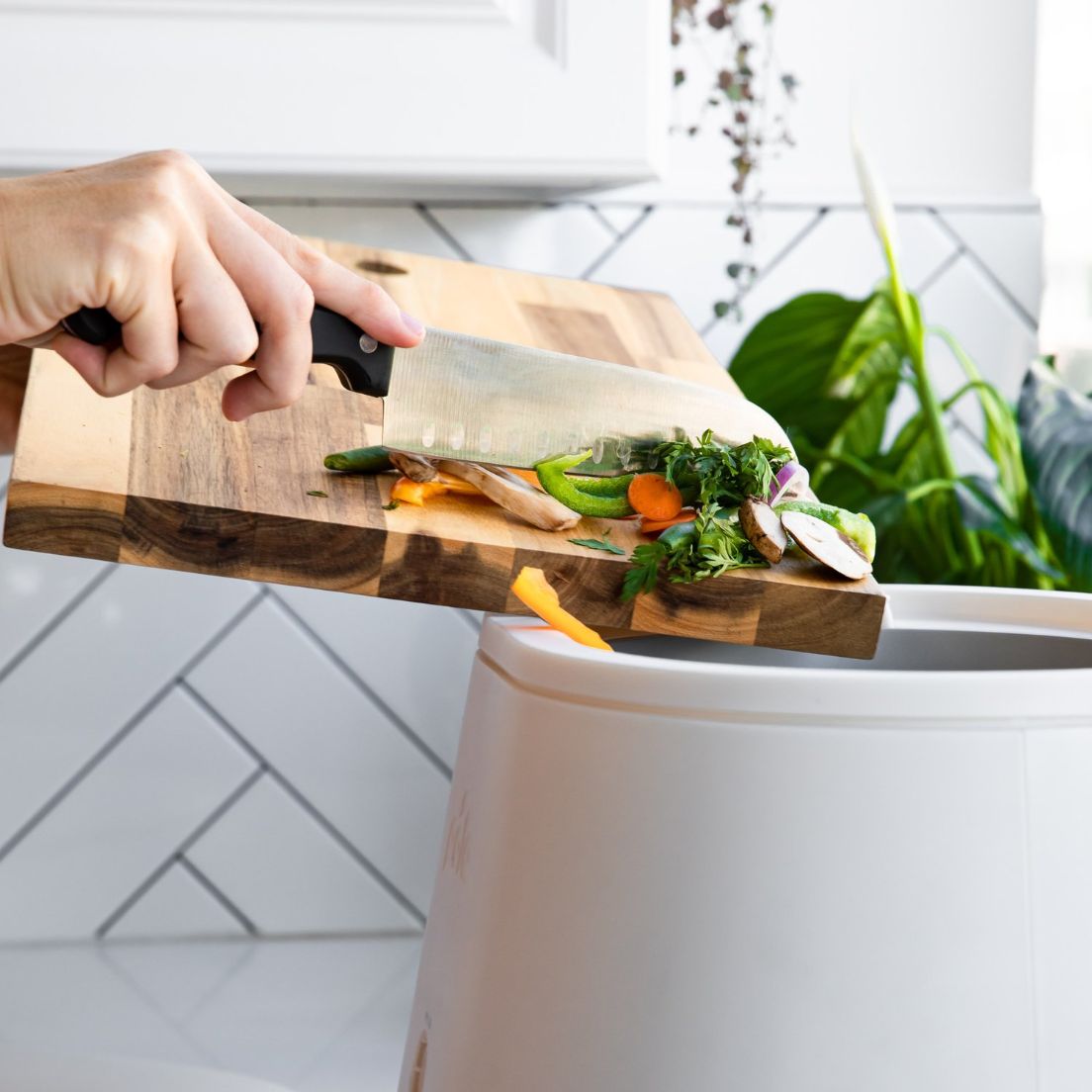
The composting process allows us to transform our food scraps into fertilizer for our plants. It’s also one the most eco-friendly ways to dispose of organic waste. Environmentally-friendly food waste disposal is more important than ever, especially in the US. The FDA reports that the US discards more food than any other country at almost 40 million tons annually. Unfortunately, this discarded food is usually left to rot in landfills.
By composting, you can save your food from the landfill, dispose of it safely, and shrink your carbon footprint. That said, composting often requires some time, energy, and money. If you’re new to composting and aren’t sure if it’s worth it, we encourage you to check out our beginner composting guide and the informative article below. We’ll be discussing:
Table of contents
To help you determine if composting is worth your time, let’s first discuss some of the pros and cons that come with the task.
12 pros and cons of composting
Is composting worth the effort? We can’t properly answer that question without covering both the drawbacks and benefits of composting. Knowing about the pros and cons of composting will also help you determine what method is best suited to your lifestyle, whether that’s an indoor compost bin or an outdoor compost pile.
Pro #1: Minimizes greenhouse gas emissions

A lot is said about how eco-friendly composting is, but why exactly is composting good for the environment? When you throw food in the garbage, it usually ends up in a landfill pile. It’s deprived of oxygen in this pile, which quickly leads to rotting. When food rots, it produces a greenhouse gas called methane. Methane emissions are no joke, as it’s one of the biggest contributors to climate change and global warming.
If you’re passionate about living sustainably and reducing your carbon footprint, composting is a must. The reason? Methane-producing microbes aren’t active when met with oxygen. Given that most composting methods involve oxygen, this prevents your food from producing large amounts of methane as it breaks down.
Pro tip: Not all anaerobic composting methods result in methane emissions. The Bokashi bin, for example, creates an acidic environment that isn’t survivable for the microbes that produce methane.
Pro #2: Replaces chemical fertilizers

Why spend money on harmful chemical fertilizers when you can make an eco-friendly version at home? Chemical fertilizers work quickly but their negative attributes outweigh the positive ones. Unlike compost, they don’t improve soil structure or soil health. They’re typically made from petroleum products, meaning they’re not eco-friendly, can cause water pollution, and can lead to toxic build up if used on a long-term basis.
Through the composting process, you can create your own organic fertilizer that’s free of dangerous chemicals like uranium, arsenic, and cadmium. By fertilizing your plants with compost, you don’t have to worry about damaging your soil’s pH. It’s also important to note that chemical fertilizers are produced in part by fossil fuels, which contribute to global warming.
Pro tip: If you want your natural fertilizer to be as effective as its chemical counterpart, add a variety of green and brown materials to your compost pile. The mixture of carbon and nitrogen-rich items will lead to healthier and more nutritious fertilizer.
Pro #3: Improves soil quality

Compost is a great addition to potted plants, vegetable gardens, trees, and more. It helps plants grow stronger by delivering nutrients like nitrogen, potassium, and phosphorus. If all that wasn’t enough, compost also improves your soil’s nutrient retention abilities by increasing its cation exchange capacity.
Pro tip: You can learn more about your soil’s needs by conducting a soil test. Using a testing kit, which you can find online, you can get readings about your soil’s pH, calcium, phosphorus, and more.
Pro #4: Decreases waste sent to landfills

As stated above, rotting food in landfills is a major contributor to global warming. Unfortunately, the transportation of food scraps to these various sites can also cause significant amounts of water pollution. Direct leachate contamination is a danger to the environment and human health.
Leachate is a black or brown liquid that comes from hazardous waste. When this waste is transported to landfills, which tend to be far from residential areas, this liquid can leak from the vehicle and come into contact with ground and surface water. By decreasing the amount of waste being sent to landfills, you can help reduce the risk of water contamination from leachate.
Pro tip: If you’re looking for other ways to reduce water pollution, refrain from pouring cooking fat, grease, oil, cleaning agents, or household chemicals down the toilet or sink.
Pro #5: Can help water absorption

There’s more to hydrating your plants than just watering them once or twice a week. You can take things further by adding organic matter, in the form of compost, to your soil to improve its water retention. By reducing soil crusting, compost can assist with water absorption and penetration into your soil. Better moisture absorption and dispersion will help your plants grow stronger and healthier!
Pro tip: Other ways of improving your soil’s water retention include tilling less regularly and minimizing the amount of bare soil between plants.
Pro #6: Maximizes crop yields

If you want to maximize your upcoming crop yields, you’ll want to start composting as soon as possible. With your own organic fertilizer, you can promote excellent crop health by adding nutrients and improving soil structure and quality. Results will vary somewhat depending on what materials you used to create your compost, but you’re sure to end up with healthier plants in the long run. Healthier plants lead to higher yields, which means more fresh vegetables for you and your family to enjoy.
Pro tip: You can also maximize crop yields by soil testing, planning for extreme weather events, and investing in high-quality seeds.
Con #7: May require an initial investment

If you want to start composting, you’ll likely have to make an investment of some kind. This could be a small investment into wooden pallets for a DIY bin or a larger investment into an efficient composter for long-term use. Outside of the bin itself, you may end up spending money on composting tools like a pitchfork, shovel, a compost moisture meter, or a compost thermometer.
Pro tip: If you really want to save money, there’s nothing wrong with building your own DIY compost bin. A DIY bin may not be terribly efficient, but it will still allow you to break down your food scraps and yard waste like leaves and fresh grass clippings.
Con #8: Potential for unpleasant smells

It’s no secret that decomposing food scraps can smell as bad as any bag of trash. It’s the kind of odor that will immediately make you uninterested in indoor composting. Thankfully there are plenty of ways to produce compost without dealing with awful odors. If your compost heap smells, that’s likely a sign that the pile has gone anaerobic. To prevent odors, and maintain a healthy pile, you need to ensure that your compost is properly aerated and has a good balance of nitrogen and carbon sources.
Pro tip: You can prevent odors when using an indoor composting bin by piling brown ingredients on top like wood chips and newspaper.
Con #9: Usually involves some labor

Have you just begun looking into how to start composting? If so, you may have seen outdoor compost piles being hailed as the easiest method. While they’re definitely the most straightforward, they do require a fair amount of labor. This includes transporting your food scraps from the kitchen and turning the pile once or twice a week to manage moisture and distribute oxygen. For some people, this labor isn’t worth the organic fertilizer you get in return.
Pro tip: If you don’t see yourself turning your compost pile with a shovel or pitchfork, there are many alternatives to choose from. Compost tumblers make turning your pile easier while Lomi requires no labor at all.

Con #10: Can take weeks or months

The time it takes for your kitchen scraps to become usable compost varies depending on the composting method. Cold composting, however, can take anywhere from six months to one year to produce finished compost. Many people would prefer to just buy a chemical fertilizer. Other composting methods thankfully take much less time, as a sealed tumbler can convert waste to compost in as little as three weeks.
Pro tip: You can speed up the composting process in a variety of ways. This includes turning your pile regularly, shredding organic waste before adding it to the pile, and properly balancing your green and brown materials.
Con #11: Might attract pests

Aerobic composting may not result in greenhouse gases, but it can attract pests. Decomposing food is a favorite of rodents, bugs, and larger animals like raccoons and bears. The odors emanating from open bins and exposed heaps can definitely get their attention. If you want to ward off these unwelcome visitors, you’ll need to store your waste indoors or in a bear proof compost bin of some sort. If you opt to go forward with an open compost heap, turn it regularly to lessen its odor.
Pro tip: If you’re really put off by the idea of attracting rodents or bugs, you may want to consider investing in an indoor electric composter. One advantage of a composter like Lomi is that it doesn’t release the odors that tend to attract pests.
Con #12: Unattractive appearance

When some people think of composting, they imagine a big pile of food that smells and is mid-way through decomposition. This isn’t the way that all piles look (or smell) but some composting set-ups are quite unattractive. The good news is that you don’t have to settle for an open pile of decomposing food if you find that unappealing. The best compost bin is one that’s visually appealing and works with your current space constraints.
Pro tip: There are many alternatives to open compost piles. You could opt for a sealed indoor compost bin or a compost tumbler.
The final verdict: is composting worth it?

Composting is absolutely worth it for anyone that wants to live a more eco-friendly lifestyle. Taking the time to compost reduces the amount of waste sent to landfills and leaves you with a natural fertilizer that can nourish your plants. You can also choose a composting method that’s suited to your preferences.
Check out Lomi - the easiest & quickest way to compost

Composting doesn’t have to be a long and tedious process. The Lomi kitchen composter can transform your food waste into nutrient rich soil amendments in a matter of hours. Using a mixture of heat, abrasion, and oxygen, this electric composter breaks down waste in a way that’s silent, odorless, and incredibly efficient. These are just a few of the device’s many advantages.
So, should you buy Lomi? The answer depends on a few factors. If you live in a small apartment or simply prefer to compost indoors, Lomi could be the perfect fit for you. It’s compact and fits nicely on any kitchen counter. It also saves you from having to worry about pests and requires no additional labor!
The Lomi composter is just one of the many excellent composting methods out there. If you don’t mind waiting weeks or months for finished compost, you can also opt for an outdoor compost pile or a composting tumbler. No matter what method you choose, you’ll be doing your part to protect our planet while creating a quality natural fertilizer for your plants.
Written by: E Sawden
